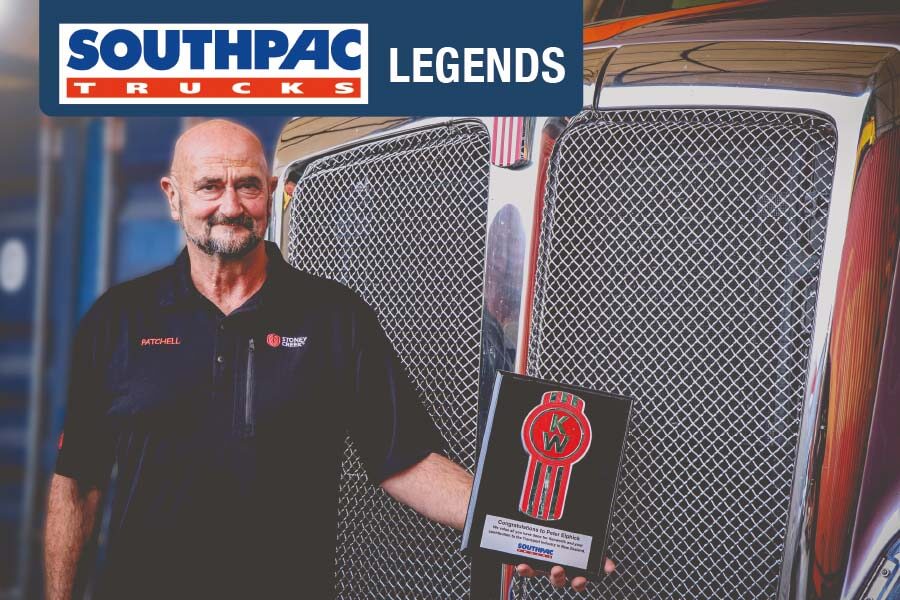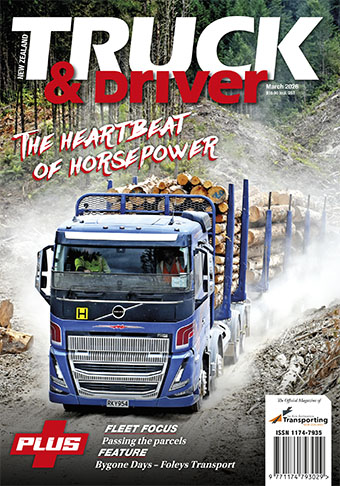Southpac Legends


Peter Elphick
Southpac Legends
Peter Elphick, long-time Logging Production manager with Patchell Industries, and until recently a shareholder in the Rotorua trailer maker, is heading into what promises to be a busy retirement.
But though he’s looking forward to the projects he has planned, Peter admits he will also miss the day-to-day contact with people in the transport industry – many of whom have become firm friends.
This month’s Southpac Legend is richly deserving of the Legend title, Peter’s ‘can-do’ attitude helping guide many a challenging project through to a successful conclusion.
Welding and general fabrication have been the constant themes in Peter’s career, yet he says that wasn’t the path he began after he left school in the mid-1970s.
Peter Elphick, long-time Logging Production manager with Patchell Industries, and until recently a shareholder in the Rotorua trailer maker, is heading into what promises to be a busy retirement.
But though he’s looking forward to the projects he has planned, Peter admits he will also miss the day-to-day contact with people in the transport industry – many of whom have become firm friends.
This month’s Southpac Legend is richly deserving of the Legend title, Peter’s ‘can-do’ attitude helping guide many a challenging project through to a successful conclusion.
Welding and general fabrication have been the constant themes in Peter’s career, yet he says that wasn’t the path he began after he left school in the mid-1970s.
“I actually started an apprenticeship as a coachbuilder with the NZ Railways at the Otahuhu workshops but didn’t enjoy the bookwork and the rules and the formal training. So, I left and went to work with a firm in Tauranga, Polecat Industries, which handled all manner of general engineering – building and repairing trailers, fabricating glasshouses and a lot more.”
Not long after, he foreshadowed his future work life with a four-month spell with Patchell’s, before going into business with a partner. That partnership broke up after a time, and he subsequently worked with a contractor, Gary Clark, installing LPG facilities in service stations across the central North Island for Rockgas.
He recalls that time fondly: “It was lucrative work and very enjoyable. I was primarily the welder, but I also dug the ditches and installed the tanks and pumps. However, after about two years we’d broken the back of it – this was a time when there was a big shift to LPG, but after we’d finished the installations it became more a matter of routine maintenance, which was then handled by Fuelquip.”
In 1986, with the LPG work finished, he returned to Patchell’s. Again, this promised at first sight to be just as brief as the first time, for it was on a short-term contract...but quickly morphed into a permanent position, cemented further in 1994 when he bought a stake in the company.
His near 40-year association with Ian Patchell has always been “interesting” says Peter: “It has been a good partnership and I thank him very much. Though Ian has very firm views and expresses them just as firmly, you can always debate an issue with him, and he is always true to his word.
“The most important thing about my career is that I worked for the customers in the first instance, not the firm. And if you can keep that in mind, everyone gains in the long run. I’ve been very lucky to have a good rapport with our customers and have really enjoyed working on some cool projects, among them being the trailer designs development and the innovation of the Patchell product.
“I’ve been very lucky to meet and work with some of the most outstanding people in the New Zealand transport business.
“Among our memorable projects have been the 175-odd wharf trailers for Quality Marshalling, ISO and C3 at Tauranga, and the slip-on fifth wheel/log stems bolster subframe for McCarthy Transport that allows a tractor unit to be detached quickly.
“I had a little bit to do with designs, but only in the background, determining whether a project could be pushed through or not. My primary responsibility was running the workshops and looking after the cost modelling and invoicing of the various jobs.”
He has fond memories, too, of workmates, many of them younger people and sometimes in need of a bit of guidance: “I especially remember some of the people I’ve dealt with at work who I’ve helped train and, in some cases, turn their life around – ratbags who I’ve been able to be take aside and put work into. One of the key lessons, I’ve found, is that learning what failure is about is often better than winning.”
Peter, and those close to him, have lived through some challenging – but at the same time, rewarding – experiences.
“For all the underlying stress, those experiences have been life-affirming. If I had the time and ability, I would like to have written a book about them. So many people, and often they’re the stronger ones, hold too much inside, and suffer as a result. And over the years I’ve dealt with a lot of people like that, who can’t see themselves sinking into that same hole.”
“I don’t regret the walk we’ve been through. Because of the situation we’ve learnt so much of value.”
At 62, Peter reckons it’s a good time to be leaving the pressure of business behind, not least because some of it is self-generated: “I didn’t know how to say ‘no’, which means you pressure yourself by taking on too much work and then wonder how you’re going to get it done. However, I’m one of those lucky guys who has a great, supportive wife in Sandra, and she has helped me through the frantic times.
“There will be aspects of the business I’ll miss, but I’ve never wanted to end up as a silly old man, struggling to do a young man’s job.”
That said, is it tending the roses and the occasional game of bowls for Peter now? No way – if anything, his life is set to become ever more frantic, as he explains: “We’ve got a couple of blocks of land at Erua, near National Park. One of them I’m developing and going to build an off-grid cabin on. I want to finish it before I get too old and regret not being able to. I’ve cleared the pines and gums that were on the block and will let the second-growth native bush come back.
“It’s something I’ve wanted to do for a long time. In my early days I worked for an environmental forestry group in the Bay of Plenty and I’ve always had an interest in off-grid living. Some years ago, I bought a three-acre block down there with a mate and we built a two-storey American-style barn there that works essentially off a big fireplace.
“We do quite a lot of hunting out of there, fallow deer and pigs. At that venue we’ve often played host to Patchell Industries clients.”
The new cabin – on a separate, larger block – will be fully off-grid, using solar power for electricity...but will also have its own sewage system, for as Peter quips, “You’ve got to have flush toilets.” The majority of the internal finishing will be in timber, primarily macrocarpa and pine.
The views are spectacular, he says: “From where we’re building you can see in a big circle, from Mount Ruapehu in one direction and round to Mount Taranaki in the other.
“When I look back on my career, I would like to thank the staff and clients of Patchell Group for the support and loyalty over so many years; it has made me who I am today. I am also humbled by Southpac’s recognition, I have really enjoyed being part of such a passionate and successful industry.”



 + EQUIPMENT GUIDE - FREE
+ EQUIPMENT GUIDE - FREE
